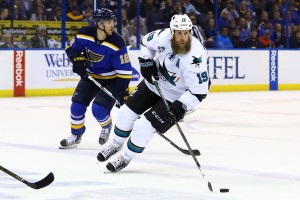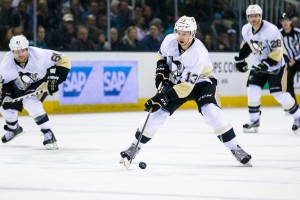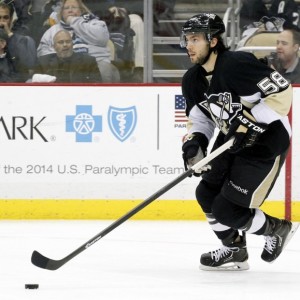The San Jose Sharks and Pittsburgh Penguins will meet up for the Stanley Cup Final. Typically, we can look to prior playoff series for some guidance from a similar style matchup. For this series, a look back won’t be much help.
The Sharks have played three bigger and more physical teams in the playoffs. The Sharks are not a fast team, per se, though they play fast. They are not overly big or overly physical, but they can play that game. Their ability to handle a heavy, physical game from opponents is big reason why they are where they are. It also won’t matter much in the next round. The Blues, Kings and Predators, were all slower than San Jose. Not Pittsburgh. They are a smaller, speedier team. The Sharks have not seen that in the playoffs.
Pittsburgh has played the Rangers, Capitals and Lightning. The Rangers and Lightning are not similar to the Sharks. The experience Pittsburgh gained against the Capitals seems the series most likely offer useful learning. But digging a bit deeper, there are too many differences to offer much help.
New to Pittsburgh
The Penguins have not dealt with a blue line like the Sharks have. The Caps blue line is good, but no other team has a 1A and another 1A on defense like San Jose. Heck, no other team else has anything like Brent Burns, period. He is a Norris finalist for the leagues’s best defenseman, even though he might be the second best defenseman on the team behind Marc-Edouard Vlasic.
The Penguins did face an offense in their series against the Caps which, on the surface, might seem to resemble the Sharks. But the comparisons only go so far. Like the Sharks, the Caps top line has an elite set-up man who wears 19 and an elite goal scorer who wears 8. Style-wise, though, they are very different. Against the Caps, Pittsburgh leaned heavily on defenseman Trevor Daley. He was second on the Pens in ice time, but a broken ankle ended his postseason in Game 4 against Tampa Bay. Whatever learning might have been garnered in the series against the Caps is greatly diminished by Daley’s absence.

The Sharks top line, the Joe Thornton line, is tough. They’ve faced several top defensemen in the postseason, better than what the Pens have to offer. No one has stopped them and they’ve only been slowed down a few times. If the Pens can’t match up, trouble will find them. An example comes from the third period of Game 5 against St. Louis. The period began with the scored tied. Just six seconds into the period, the Blues iced the puck. Sharks coach Peter DeBoer saw the matchup he liked and sent the Thornton line out. Ten seconds later, the Sharks potted the game-winning goal. What can the Pens learn from this? Don’t ice the puck? Good luck with that. As challenging as it is matching up with the Thornton line, it is worth noting the Sharks’ top scorer, heck the playoffs’ top scorer, resides on the Sharks second line; Logan Couture has 24 points in 18 games. The Penguins learning will have to start from scratch.
Among the forwards San Jose has neutralized or simply shut down are the top two scorers from each opponent they faced: Anze Kopitar, Ryan Johansen, Filip Forsberg, Vladimir Tarasenko, Alexander Steen and Jeff Carter. Taken as a group, these very good players combined for 36 postseason games played against San Jose (18 x 2). Their numbers in those 36 games: 16 points and minus-21. Pittsburgh hasn’t seen a defense this good. But there is a flip side.
New to San Jose

The Sharks have played against several very good forwards, but no team with terrific forwards at the level of Sidney Crosby and Evgeni Malkin. Add Phil Kessel into the mix on a line with great chemistry and it’s a different animal than anything San Jose has faced. Also different, Pittsburgh’s smaller, speedier players with fresh legs including Bryan Rust, who scored twice in the series clincher against Tampa Bay, and Conor Sheary.
If Pittsburgh wants to learn something about what can succeed against San Jose, they can look to the only forward line has had a good series against San Jose. The Pens hope the Kessel line, with Nick Bonino and Carl Hagelin will resemble the line that feasted on San Jose; Nashville’s line of Colin Wilson, James Neal and Mike Fisher. The Sharks learning will also start from scratch.
The lone area there might be useful learning comes with the Pens defensive group. The Pittsburgh defense group has similarities to the Los Angeles Kings, the Sharks opening round opponent.
The Kings and Pens each have one high-end defenseman, Kris Letang from the Pens and Drew Doughty from the Kings. After those two, though, it’s mostly players with limited or modest pedigrees. Also in common, a key injured defenseman (the Pens Daley and the Kings Alec Martinez). As a result, both teams rely heavily on their top defenseman. Doughty, a Norris finalist, averaged over 30 minutes a night in the series against the Sharks, but had only one point and was minus-5. Letang is averaging nearly 29 minutes a game in the playoffs. I fully expect San Jose to be aggressive against Letang, seeing if they can do to him what they did to Doughty. If they can, it is big trouble for Pittsburgh.
What I’ll Look For Early On

My own sense is that zone exits will be critical in this series. The best way to slow the top offense in the postseason, San Jose, is to keep them from getting to the offensive zone. I expect the Penguins speed to create challenges for the Sharks to get the puck cleanly up ice. I’d expect the Sharks top defensive pairs to handle this, though it will not be easy. I expect the Pens to exploit the Sharks third defensive pair to the point DeBoer may need to make a personnel change. Meanwhile, the Sharks have been effective at preventing speed in transitions/odd man rushes while still executing an effective forecheck. It is tough to do both well. The Sharks have. I expect that to be an area where a bigger, heavier Sharks team will attempt to wear down Pittsburgh. They will target Letang, the Pens best puck mover, forcing other defensemen to advance the puck. Both teams will look to capitalize on turnovers from zone exits, looking for quick strike scores.
In trying to find what prior series might offer, the pickings were slim. Neither team has much to draw on from their recent playoff experience, making this series intriguing and mysterious. In his recent press conference, DeBoer spoke about a ‘feeling out’ process in the opening game of the series. I’m not sure I believe him. I get a sense both teams will be ‘full on’ from the initial puck drop. Whatever needs to be learned is going to happen on the ice and in a hurry. Class begins Monday evening.
Zeke’s Notes
I liked the towel giveaway the Sharks had in Game 6 against St. Louis. It played on the Sharks logo, a shark chomping on a hockey stick. On the towel, they replaced the chomped hockey stick image with a chomped saxophone, appropriate against the Blues. I’d guess there will be a chomped penguin at some point.
San Jose is familiar with Penguins defensemen Ben Lovejoy and Justin Schultz; they played in the Pacific Division in recent stints with Anaheim and Edmonton, respectively. Bonino was a Sharks draft pick in 2007, the Sharks traded his rights while he was still in college. The Sharks’ Nick Spaling and Paul Martin both played in Pittsburgh last season. The Sharks Joel Ward and the Pens Patric Hornqvist were teammates for three seasons in Nashville.
Pens coach Mike Sullivan played eleven NHL seasons. His first two and almost a half NHL seasons were with the Sharks in their initial seasons. Sullivan was minus-63 as a Shark. It is not as bad as it sounds, the Sharks were outscored by 336 goals in their first two seasons.
At the season’s midpoint, 41 games in, San Jose had 43 points, Pittsburgh had 44. The playoffs were not a given for either team. In the second half of the season, San Jose added 55 points. Pittsburgh added 60. The regular season games between the teams were both played in the first half of the season.
Game 3 at SAP Center, the first Stanley Cup Final game in Sharks history, presented a scheduling conflict. The game and legendary tenor Andrea Bocelli, considered by many to be the world’s greatest singer, were both scheduled for June 4. Bocelli moved his appearance to June 3. With Bocelli in San Jose and now with an open spot on his schedule for June 4, it begs the question, does he know the Star Spangled Banner?